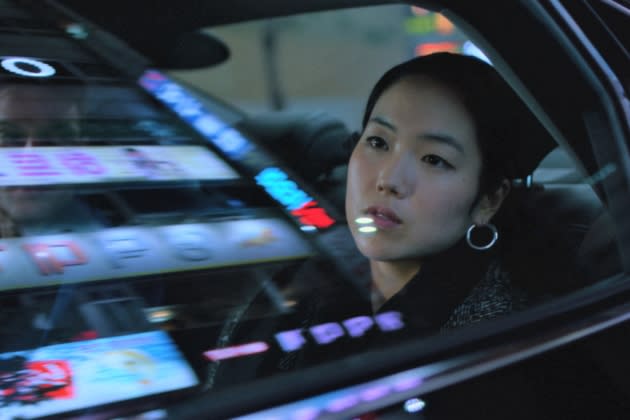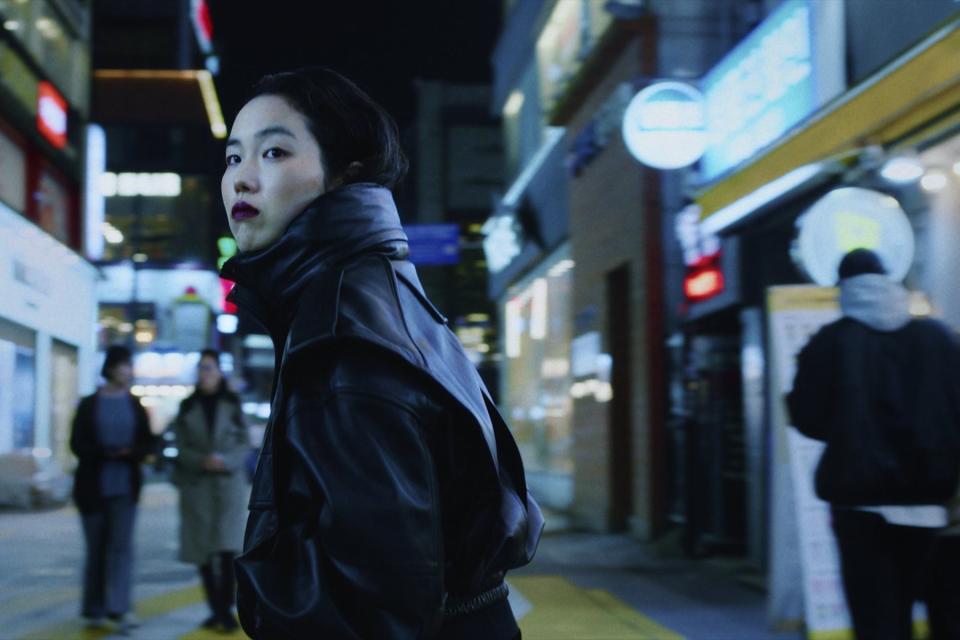‘Return to Seoul’ Is One of the Best Identity-Crisis Movies Ever

“Do you know what sight-reading is?” a young woman asks her dining companions. Neither of them know, so she explains: When you look over a score for the first time, “you have to able to analyze the music in one glance, evaluate the danger… and jump in.” The key is knowing how to read the signs, she adds. That applies to both music and in life.
Her name is Frédérique (Park Ji-min), though everyone calls her Freddie. She is South Korean by birth, but only speaks French — having been adopted by a couple living in the French countryside when she was a baby, Freddie has been raised as a westerner. She’s come to Seoul for a two-week visit to seek out her birth parents. Tonight, however, she’s reading the signs in the BBQ joint where she’s eating on her first night in town, and they are apparently telling her to grab a bottle of soju and insinuate herself, her new friends and two other random customers into another table’s dinner party. It’s the sort of impulsive move that end evenings with a battlefield of empty bottles, slumped bodies, and casual hook-ups. You know, the kind that often defines someone in their twenties, still figuring out who they want to be. Or maybe a lost soul with no idea when, where or how to be found.
More from Rolling Stone
One of the Most Controversial Movies Ever Is Back in Theaters
An Urgent Ode to Worker Solidarity, Through the Eyes of a Desperate Woman
Léa Seydoux's Sexual and Spiritual Awakening in 'One Fine Morning'
It is a truth universally acknowledged that 2022 was a stand-out year for female actors — you had your next-gen “scream queen” royalty (looking at you, Mia Goth and Keke Palmer), your level-up dramatic and comedic breakouts (we see you, Danielle Deadwyler and Lashana Lynch, Stephanie Hsu and Kerry Condon), your clash-of-the-titans awards-season contenders (whether Cate Blanchett or Michelle Yeoh walk home with an Oscar next month, we all win). Yet within those same ranks was a stealth nominee for the annual best-of canon, giving the kind of quiet monsoon of a performance that sticks with you months after you’ve seen it. The fact that it came courtesy of a neophyte didn’t matter.
Blessed with a blink-and-you-missed-it qualifying run in late 2022 after a festival-circuit run — it played the Un Certain Regard section at Cannes — Return to Seoul got swept aside by the usual early winter hubbub that is the first few laps of the Oscar, et al. race. Now that it’s finally getting a proper theatrical release, you can see why it not only deserves your attention, but earns the right to be called one of the best movies about identity crises ever. The idea that Park Ji-min, a visual artist who works with plastics, had never acted before writer-director Davy Chou cast her in this (!) is, frankly, almost as astonishing as what she’s doing onscreen. There’s a lot going on in his tale of a young woman sifting through her past in search of answers. She’s responsible for 99 percent of it.
Not that Chou doesn’t have a vision, an artistic sensibility or several pints of his own plasma running throughout this deft, extraordinary portrait of a person in flux. A French-Cambodian director who started as a documentarian (his 2011 debut Golden Slumbers is both a love letter to and a peerless primer on Cambodian cinema), he has a way of letting things simply unfold before his cameras, and making you feel like he’s discovering something alongside you, the viewer, even when he dials up the cinematic stylistics. Chou wears his influences lightly, which is why you may find yourself thinking of Claire Denis and mid-period Wong Kar-wai during Freddie’s neon-night nocturnal adventures (a notion that Thomas Favel’s dazzling cinematography only reinforces), or maybe Masculin Féminin-era Godard, as you follow his high-on-youth protagonist without feeling like you’re merely watching fawning homages to those auteurs. The same goes for his collaborators, who have a way of using reference points as a means rather than an end; the way composers Jérémie Arcache and Christophe Musset, for example, seem to be pulling out the bare-bones beats from Bauhaus’ goth anthem “Bela Lugosi’s Dead” and refashioning them for Freddie’s hedonistic field trips is bliss-inducing.
Yet it’s Park who makes Return to Seoul such a moving thing to experience. Riding shotgun with her character as she attempts to make contact with her biological mother and father, you get to witness Freddie’s disappointments, dead-end maneuvers and distractions during her trip back. Her mother initially refuses contact via the adoption agency; Freddie’s father, a repairman played by veteran South Korean actor Oh Kwang-rok, seems both emotionally bewildered and overly sentimental by his child’s presence after so many years of wondering what happened to her. Asked when she’ll be moving back, Freddie replies that she can’t speak the language, has no idea what the culture is like and besides, she’s French. We find out from a phone call to her maman that this whole excursion was a whim. Home is neither the country she’s currently in nor the one she’s left to come here. More often than not, Chou just trains his lens on Park’s face, watching as she processes every turn. And as she practically surfs these emotional tides in real time, you feel like filling in the gaps of who Freddie is, bit by bit, close-up by close-up.

Or maybe “discovering” where those gaps begin and end is a better way of putting it. Most filmmakers would have stopped at the end of that first visit, which finds Freddie frustrated by the lack of reconnection, the palpable sense of dislocation she feels, and the sense that this is a void that may never be properly filled. There’s enough in that storyline, filled with the heady buzz of being young and restless and the gnawing ache of feeling rootless, to make for a rich enough narrative on its own.
Yet Chou and Park keep going, and Return to Seoul keeps pushing the timeline forward. Freddie comes back to South Korea several years later, this time as a consultant for a weapons-selling firm. She sports a vampy, dark-lipstick look, pinging between expensive dinners with a French arms dealer (Louis-Do de Lencquesaing) and haunting after-hours clubs with a tattoo-artist boyfriend (Lim Cheol-hyun). Later, she’s morphed into a slightly more mature corporate employee, forgoing meat and booze for meditation. Still later, she’s a backpacker with a pixie cut. Guys come and go. Things get better with her father and Freddie’s extended family. Leaps forward are matched by steps backward. The through line all comes down to Park, who lets you observe progressions, regressions, and the shaky foundation on which all of it rests. The performance is the movie. Strike that: Park’s performances, plural.
Chou has said that the film isn’t autobiographical — nor, despite the fact that Park herself was born in Korea and raised in France, is this her story. Yet the two of them have made something that feels so intensely personal and infuses so much life into this young woman’s trek toward self-discovery. It takes quite a journey to get to the point where you can text “I think I’m happy” even without the guarantee of a happily ever after. And it takes one hell of a filmmaker-actor duo to make a climactic callback to that “read the signs” moment so sublime that it takes you by surprise, even as you’re realizing, right before the final credits roll, that they have just completely stuck the landing.
Best of Rolling Stone


